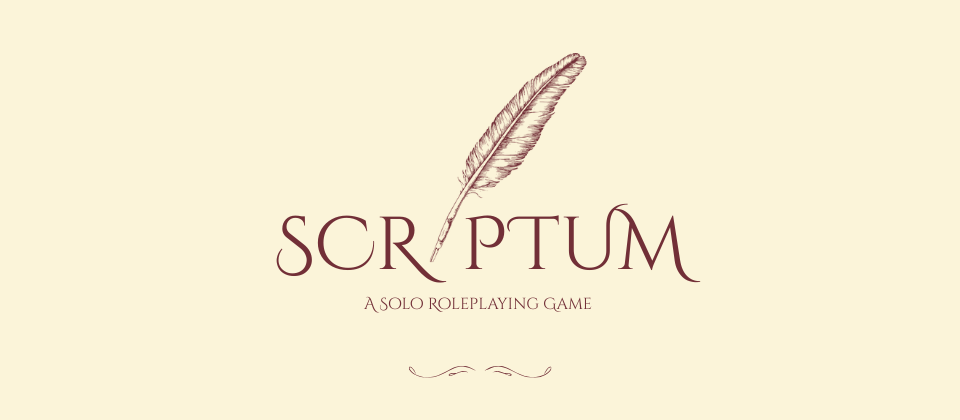Devlog 1 - Scriptum
Hi everyone!
I want to write a short series about how I created the final version of SCRIPTUM.
CULTURE
Scriptum was born for the Eternity TTRPG jam, which had the theme “Libraries and Collections.” A fascinating prompt that immediately made me think of a game about writing and finding books.
A bit like in video games, when you explore a world and come across journals or letters that reveal hidden lore: I wanted to capture that same feeling of discovery, of a world telling its story through texts.
At first, the idea was simple: the wanderer finds books and collects them. Interesting, but also a little empty: books risked being just objects.
So I took a step further: books wouldn’t just be collectibles, they would be building blocks to create entire Cultures.
Each text became a piece of a larger mosaic: the life, values and contradictions of a people.
That change of perspective transformed the game: no longer “find books,” but discover Cultures through books.
WHY THERE ARE NO STATS
In the first draft, Scriptum had two stats: Body and Mind.
- Body was used to face concrete obstacles: avoiding traps, fighting guardians, etc.
- Mind was used to interpret texts: decoding symbols, extracting knowledge, etc.
It was a classic structure: conflicts → dice rolls → success or failure.
It worked, but I felt I was moving away from the real heart of the game.
The real question wasn’t whether the wanderer got the book, but HOW they reached it and WHAT it revealed.
I didn’t want the focus on dice rolls, but on the narrative process itself:
-
How is the book kept?
-
Who protects it?
-
Why is it considered important?
Even these questions alone say a lot about a culture.
So I made a radical choice: no stats, no dice.
In Scriptum you always get the book: the challenge is to describe the journey and uncover the secrets within. The result is a purely narrative game, where the focus is on writing, not rolling dice.
THE DOUBT
Here’s the dilemma: removing randomness made Scriptum closer to my vision, but maybe less “appealing” for players who expect dice, cards or tokens.
And there's another thing: Scriptum requires a lot of writing. You need to describe places, situations, books, Cultures. It's meant to be slow and reflective. Sometimes I asked myself if I should add a light system to resolve conflicts with dice or cards, just to bring more variety.
But in the end I chose to stay true to the idea that mattered most to me: a game built entirely on narration and imagination.
I'M PROUD OF SCRIPTUM
Despite the doubts, I’m PROUD of Scriptum.
It’s not just my longest and most complete game so far: it also marked a personal step forward.
I wrote more pages than I ever thought I could. I added examples, explanations and tables to make the game clearer and more accessible. I worked on the layout, to make it pleasant to read and flip through.
Along the way, I learned a lot: how to think like a designer, how to make hard choices, how to focus on what I really want to share with a game.
And most importantly, I gained confidence: now I know I can create manuals that are more complete and more personal.
Scriptum is just a first step, but it’s an important one.
Thanks for reading!
If you liked this post, you can subscribe to my Substack here: Substack
If you’d like to support me, you can buy me a coffee on Ko-fi: Ko-fi
Get SCRIPTUM
SCRIPTUM
A solo journaling TTRPG about discovering cultures through their books.
| Status | Released |
| Category | Physical game |
| Author | alxlinear |
| Tags | Creative, diceless, Indie, journaling, Narrative, solitaire, Solo RPG, storygame, Tabletop, Tabletop role-playing game |
| Languages | English |

Leave a comment
Log in with itch.io to leave a comment.